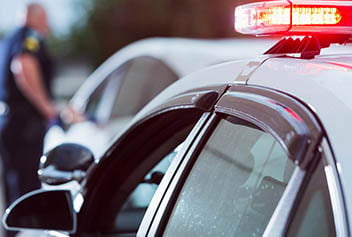A “traffic control device” is defined under Ohio Revised Code Section 4511.01(Q)(Q) as a flagger, sign, signal, marking or other device used to regulate, warn or guide traffic, placed on, over or adjacent to a street, highway, private road open to public travel, pedestrian facility, or shared-use path by authority of a public agency or official having jurisdiction, or, in the case of a private road open to public travel, by authority of the private owner or private official having jurisdiction.
A “traffic control device” is different than a “traffic control signal.” A “traffic control signal” is commonly known as a traffic light. The technical definition for “traffic control signal,” as set forth in Section 4511.01(R)(R), is any highway traffic signal by which traffic is alternately directed to stop and permitted to proceed. For the page addressing the offense of disobeying a traffic signal, click here.
Disobeying A Traffic Control Device
Disobeying a traffic control device is prohibited by Section 4511.12(A). Under this section, drivers generally are required to obey the instructions of any traffic control device, unless otherwise directed by a police officer.
Notably, where signs are required to control traffic in the Ohio Revised Code, the sign must be in proper position and sufficiently legible to be seen by an ordinarily observant person. Otherwise, the signed is unenforceable against an alleged violator. Similarly, where a sign is not required to control traffic in a given section of the Ohio Revised Code, that section shall be effective even though no signs are erected or in place.
Penalty For Disobeying A Traffic Control Device
Disobeying a traffic control device ordinarily is a minor misdemeanor. The potential penalty for a minor misdemeanor traffic offense includes the imposition of a fine of up to $150, up to 30 hours of community service and court costs.
But if, within one year of the offense, the offender previously has been convicted of or pleaded guilty to one predicate motor vehicle or traffic offense, then disobeying a traffic control device is elevated to a fourth-degree misdemeanor. The potential penalty for a fourth-degree misdemeanor traffic infraction includes the imposition of a jail term of not more than 30 days, an additional or alternative community control sanction plus reimbursement for the cost of this sanction, a fine of up to $250 and court costs.
And if, within one year of the offense, the offender previously has been convicted of two or more predicate motor vehicle or traffic offenses, then disobeying a traffic control device is elevated to a third-degree misdemeanor. The penalty for a third-degree misdemeanor traffic infraction includes the potential imposition of a jail term of not more than 60 days, an additional or alternative community control sanction plus reimbursement for the cost of this sanction, a fine of up to $500 and court costs.
Community control sanctions generally can include residential placement, house arrest, drug/alcohol testing and treatment, specified education and training, community service, curfew, probation, etc. Under certain circumstances, the court also may order an offender to pay restitution to any identifiable victim who incurred an economic loss as a result of the violation.
Points Assessed For Disobeying A Traffic Control Device
A conviction on a traffic ticket for disobeying a traffic control device carries two points in Ohio on an offender’s driving record. For more information on how the Ohio Bureau of Motor Vehicles (BMV) processes points for moving violations and the substantial penalty for excessive points accumulation, press Ohio BMV Points System.
Contact A Lawyer About Your Citation
Frequently a lawyer can appear in court and resolve a traffic case in the client’s absence, provided both the court and the prosecutor agree. This saves the client the aggravation of taking time off from work, fighting traffic to get to court on time, waiting for potentially hours for the case to be called, standing in long lines and potentially having to do it all over again if the case is continued.
If you are seeking a traffic lawyer, contact us at 614.695.5000 or online. We offer legal representation to drivers charged with traffic tickets in the Columbus metropolitan area.

